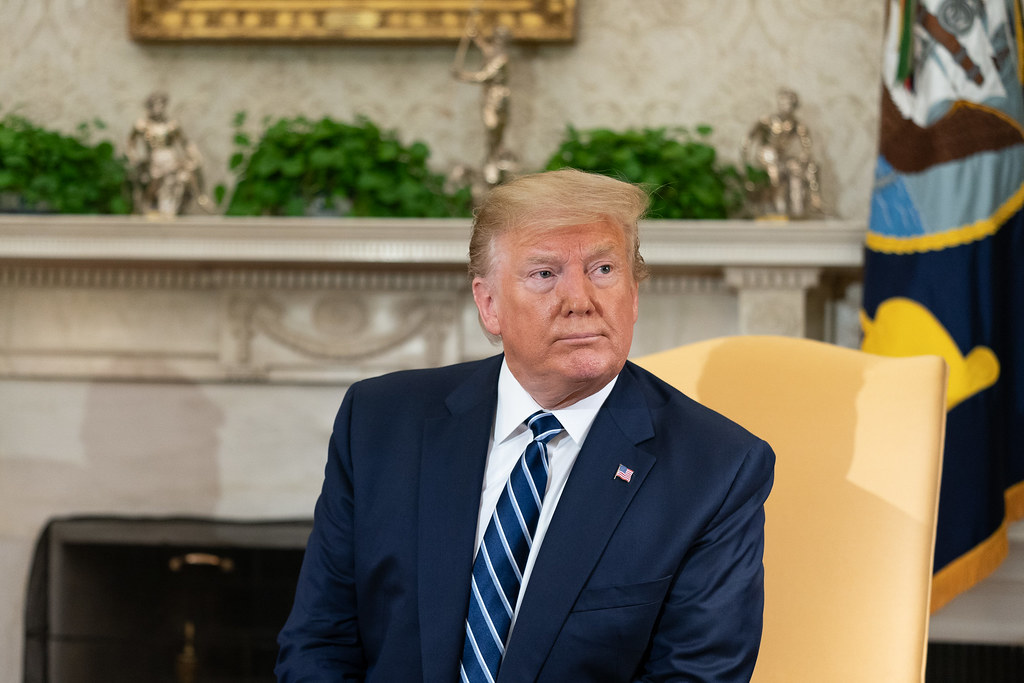In this closing world, the United States assumed the role of stabilizing and sometimes even benevolent power. It worked to provide a framework for the liberal international order and to defend international law wherever possible and desirable. Of course, we must not idealize the past; it is true that some administrations have departed from this role. George W. Bush’s unilateralism and violation of international law during the invasion of Iraq, or the atrocities committed under the Johnson and Nixon presidencies in Indochina, justified by the fight against communism, are obvious examples. But despite these abuses, successive administrations over the past 80 years have been guided by common fundamentals: the quest for stability, a commitment to economic liberalism and the promotion of liberal democracy.
Instead, Donald Trump is proposing a predatory, nationalistic and egocentric foreign policy that breaks with the ideals of his thirteen predecessors, Republicans and Democrats alike. In this new world, Trump is replacing the influence and attraction (soft power) that have made American power so successful since Harry Truman with an approach based on coercion, blackmail and force.
Over the last 100 days, the entire grammar of American international action has been brutally transformed. Respect for international borders has been called into question, notably through Trump’s desire to unilaterally redraw the border with Canada. The right of peoples to self-determination was ignored, as demonstrated by the contempt shown for the aspirations of the Ukrainian people. Support for international development was undermined by the dismantling of the US Agency for International Development (USAID). Finally, multilateral governance of major global challenges was abandoned, with the withdrawal of organisations such as the WHO or international agreements such as the Paris climate agreement.
What we are witnessing today is much more than a simple change of direction: it is a kind of revolution in the country’s foreign policy, shattering the moral and strategic consensus of the last 80 years.
Goodbye cooperation, hello coercion
In this new world, Donald Trump sees ‘win-win’ international agreements as signs of weakness on the part of the United States. This is because his vision of the world is based exclusively on a logic of power relations, in which American power must prevail without compromise. That’s why his actions over the first 100 years, including the use of economic sanctions and tariffs, are resolutely in line with the logic of a zero-sum game: an obsessive quest for indiscriminate gains at the expense of allies and adversaries alike, in defiance of established diplomatic relations and the principles of international law.
Trump’s stated ambition to seize strategic territories such as Greenland and the Panama Canal, as well as his desire to annex Canada by economic asphyxiation, illustrate this logic perfectly. Trump makes no secret of his willingness to use military force, if necessary, to achieve his objectives. During his State of the Union address in February, he stated bluntly that the United States would take control of Greenland ‘one way or another’. The recent visit by Vice-President J. D. Vance to this autonomous Danish territory, rich in natural resources and of growing importance in the Arctic, is further evidence of this expansionist drive.
Why this expansionist drive?
There are many reasons for this expansionist drive. In the case of Greenland, Trump appears to be seeking to secure direct access to strategic resources such as critical minerals and rare metals, which are essential to the US economy and defence. Trump seems to be operating under the impression that the United States is lagging behind China in controlling these resources. As if a strategic gap needed to be closed quickly in this area.
The interest in Greenland and the Panama Canal also reveals a desire to strengthen strategic control of major maritime passages. The annexation of these geostrategic points would give Washington military and economic leverage in its growing rivalry with China and, to a lesser extent, Russia.
This expansionist rhetoric is also a response to the prevailing discourse on the relative decline of the United States in the face of emerging powers. The acquisition of new territories is seen as a way of reinforcing America’s status as a superpower, by consolidating an American ‘fortress’ capable of competing favourably with emerging powers.
In his first 100 days in the White House, Donald Trump has made a radical break with the principles that have guided American foreign policy since the Second World War. Through his bellicose rhetoric and unilateral actions, he has already established himself as one of the American presidents who has done most to trivialise the use of force to achieve his objectives. His aggressive approach de facto legitimizes the territorial coercion strategies of authoritarian leaders such as Xi Jinping in Taiwan and Vladimir Putin in Ukraine.
Implications for Canadian foreign policy
The radical reversal in American foreign policy since 20 January does not mean that the pillars of Canadian foreign policy have collapsed. Canada remains a resolutely free-trading state, deeply committed to NATO and committed to multilateralism. Witness the Carney government’s current efforts to strengthen economic exchanges with European and Asian partners, with whom Canada has already signed free trade agreements.
During the federal election campaign, Prime Minister Carney said that if the Trump administration refused to assume its role as world leader, Canada was ready to take over. Although this was an electoral statement designed to mobilise Canadian nationalism rather than a commitment based on the country’s real capacity to occupy such a position, it nevertheless reflected the new Prime Minister’s state of mind. It reaffirmed Canada’s determination to preserve the foundations of its foreign policy, even in an international context marked by instability and American coercion.
Implications for Canadian sovereignty and defence
Where things get dangerously complicated for Canada is in its defence policy. The Trump administration’s statements about suffocating the country economically in order to annex us as the 51st state, and its desire to redraw the Canada-U.S. border, represent the most serious threats to Canadian security and sovereignty since the country was founded 158 years ago. Now is not the time for incredulity, but for contingency planning.
The conclusion to be drawn from such positions is clear: far more than China or Russia, it is the current US administration that represents the greatest threat to Canada, because it is intentionally and persistently attacking our vital interests. All this in a context where the nationalist and protectionist movement on which it is based now seems to be in for the long haul.
Even if Trump were to tone down his comments about Canada, the damage has already been done. His provocative statements have helped to anchor, within the American radical right, the idea that an annexation of Canada might not only be possible, but desirable, even necessary. Against a backdrop of accelerating climate change, increasing scarcity of fresh water and growing interest in strategic metals and other natural resources, Canada’s vast wealth is attracting growing interest. If Trump does not actively seek to seize them this time, it is quite possible that one of his political heirs will consider this possibility more seriously in the future.
Canada stands alone
In this context, achieving the objective of 2% of GDP devoted to defence could certainly bring Canada greater recognition within NATO, but will in no way alter the asymmetry of power between Canada and the United States. Similarly, a strategic rapprochement with France or the United Kingdom would not significantly reduce our immense strategic vulnerability to Washington. In the event of American aggression, closer ties with Europe would remain essentially symbolic, as no European partner would risk direct confrontation with the world’s leading military power to defend Canada.
Moreover, the limp reaction of the European allies, like that of NATO Secretary General Mark Rutte, to Donald Trump’s expansionist designs on Greenland and repeated threats against Canada, is revealing. In short, as long as the United States respects our sovereignty and behaves like a responsible partner, Canada can count on a wide range of allies. But as soon as an American administration adopts a hostile stance, there is radio silence. Canada then finds itself alone, entirely dependent on Washington’s will.
This stark observation calls for strategic thinking based on both the short and the long term. In the short term, it is essential to maintain the best possible relations with the United States because, whatever we say, it will remain our main economic partner. At the same time, we need to reduce our exposure to the economic risks caused by our over-reliance on the US market. We therefore need to ‘de-risk’ our economic security by actively diversifying our global partnerships and strengthening our domestic resilience, notably through sustained growth in interprovincial trade.
In terms of our strategic autonomy, Shimooka, Lanoszka and Devlen are right to point out that the desire for closer ties with Europe is partly based on an emotional reaction to Trump. This emotional dimension tends to cloud judgement and obscure the concrete limits, and even counter-productive effects, that such an orientation could entail for Canada. There are major obstacles to Canadian industry’s access to the European defence ecosystem: persistent protectionism, the unsuitability of European equipment for specific Canadian needs, and the saturation of European industrial capacities due to the war effort in Ukraine. Without dismissing the European option out of hand, it is essential to adopt a realistic and selective approach when choosing our military and technological partnerships in Europe.
Canada’s deterrent capability
In the longer term, and given that Canada finds itself isolated, it is essential to open a lucid and responsible debate on our real capacity for deterrence. Today, our one and only lever against the Trump administration is the imposition of tariffs on certain American products, a very weak tool against an economy ten times more powerful than ours, and totally ineffective against our clearly stated territorial ambitions. If Trump or any of his successors were to adopt a more aggressive stance, Canada would have no credible means of defence.
We therefore have a collective responsibility to re-evaluate, without taboos, the instruments of our sovereignty and to explore new levers of deterrence. Beyond tariff measures, there is a range of possibilities that deserve to be examined rigorously, even if this means calling into question certain values that we have upheld for decades.
These options include developing credible cyber deterrence capabilities, strengthening our conventional armed forces and, controversially but necessarily, examining the relevance and feasibility of tactical nuclear means.
In the new world, Canada’s very survival may well depend on its ability to dissuade predatory powers, i.e. to convince them that the strategic cost of their ambitions would outweigh the expected gains.
One thing is certain: by breaking with diplomatic conventions, displaying blatant contempt for international law and pursuing expansionist aims, Trump is a central player in the erosion of the foundations of global stability on which the world is closing in. This shift in American diplomacy from cooperation to coercion is creating greater instability and paving the way for a world in which only the balance of power will dictate what happens next. Faced with this reconfiguration of the strategic environment, Canada cannot remain passive: it is imperative that we draw the necessary strategic lessons.





Comments are closed.